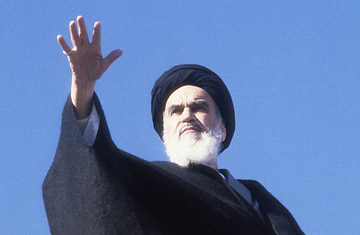
(3 of 8)
Inside the terminal, the Ayatullah was instantly surrounded by 1,000 or so members of a welcoming committee shouting, "Allahu akbar!" (God is great). Praising all those who had suffered for the revolution, from the clergy to bazaar merchants to workers and students, Khomeini lashed out immediately at the Shah and his supporters, who "destroyed our culture and turned it into a colonial culture." Then came an ominous touch: "We are only victorious when we can cut the hands of the foreigners from our lands. The agents of the foreigners who are trying to cheat our interests must know that they are now part of history. All their struggles will be in vain. I pray to God for your glory and good health, and I pray to God to help us cut off the hands of the foreigners." With that the crowded terminal rang with shouts: "Allahu akbar! Allahu akbar!"
In the days before and after the Ayatullah's return, Prime Minister Bakhtiar was almost compulsively busy: delivering lengthy radio and television speeches, introducing sweeping reform measures in parliament. To some extent, that burst of activity was a charade; almost daily, members of the Majlis (lower house) resigned in deference to the Ayatullah's commands. Said one European diplomat in Tehran: "Bakhtiar's performance is a pure piece of acting, but there's nothing behind it. I can't think of anything he's in charge of."
Bakhtiar lost both face and prestige the weekend before, when he grandly announced that he would have a summit meeting with Khomeini in Paris, only to have the Ayatullah repudiate the conference. Said Khomeini: "I will not receive that illegal man." Actually, the Prime Minister was privately trying to negotiate an arrangement whereby he might resign in favor of a Khomeini-sanctioned transitional government that would preside over elections, a constituent assembly and a referendum on a new constitution. Bakhtiar said he had been negotiating with Khomeini's local representatives, but those plans may have already been jeopardized by the arrests of five leading journalists and the beginning of the army's bloody crackdown.
Even more damaging to Bakhtiar's credibility was his open support of the military, which has tried to intimidate Khomeini's supporters by firing randomly at throngs of unarmed civilian demonstrators. On the "Bloody Sunday" of Jan. 28, the army fired directly into demonstrators gathered around 24 Esfand Square, near the university, and sniped at them from nearby rooftops for nearly four hours. By the end of the afternoon, there were 30 known dead and hundreds wounded; hospitals were jammed with the dying (see box). Bakhtiar defended the slaughter, which followed a similar assault two days earlier, as a retaliation by the army for an attack on police headquarters by civilians armed with machine guns. But in fact no eyewitness had seen the police building being assaulted.
